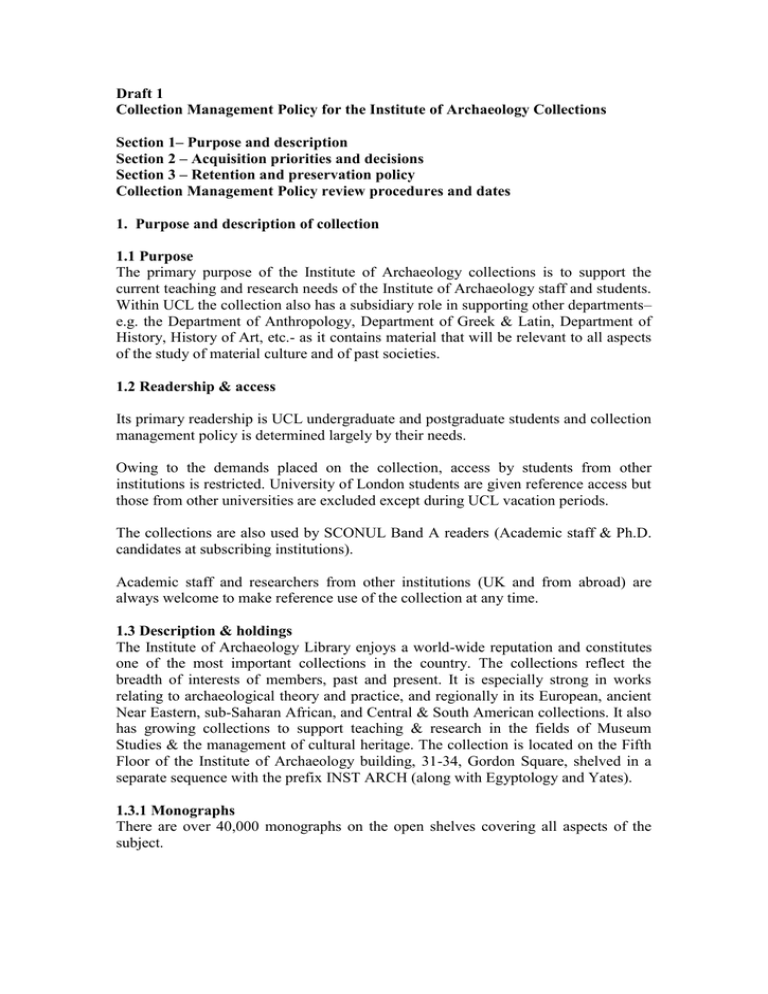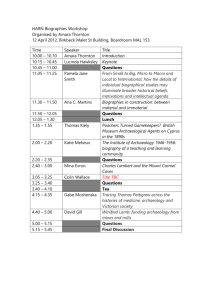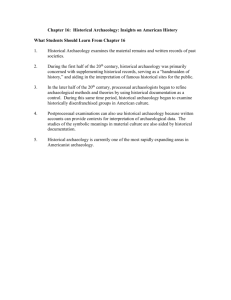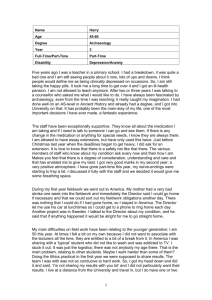Draft 1 Collection Management Policy for the Institute of Archaeology Collections
advertisement

Draft 1 Collection Management Policy for the Institute of Archaeology Collections Section 1– Purpose and description Section 2 – Acquisition priorities and decisions Section 3 – Retention and preservation policy Collection Management Policy review procedures and dates 1. Purpose and description of collection 1.1 Purpose The primary purpose of the Institute of Archaeology collections is to support the current teaching and research needs of the Institute of Archaeology staff and students. Within UCL the collection also has a subsidiary role in supporting other departments– e.g. the Department of Anthropology, Department of Greek & Latin, Department of History, History of Art, etc.- as it contains material that will be relevant to all aspects of the study of material culture and of past societies. 1.2 Readership & access Its primary readership is UCL undergraduate and postgraduate students and collection management policy is determined largely by their needs. Owing to the demands placed on the collection, access by students from other institutions is restricted. University of London students are given reference access but those from other universities are excluded except during UCL vacation periods. The collections are also used by SCONUL Band A readers (Academic staff & Ph.D. candidates at subscribing institutions). Academic staff and researchers from other institutions (UK and from abroad) are always welcome to make reference use of the collection at any time. 1.3 Description & holdings The Institute of Archaeology Library enjoys a world-wide reputation and constitutes one of the most important collections in the country. The collections reflect the breadth of interests of members, past and present. It is especially strong in works relating to archaeological theory and practice, and regionally in its European, ancient Near Eastern, sub-Saharan African, and Central & South American collections. It also has growing collections to support teaching & research in the fields of Museum Studies & the management of cultural heritage. The collection is located on the Fifth Floor of the Institute of Archaeology building, 31-34, Gordon Square, shelved in a separate sequence with the prefix INST ARCH (along with Egyptology and Yates). 1.3.1 Monographs There are over 40,000 monographs on the open shelves covering all aspects of the subject. Currently nearly 700 current journal titles are held which are deemed specific to Archaeology. These are interfiled along with Classical Archaeology and Egyptology titles in a single sequence alphabetically. 1.3.3 Electronic resources This type of resource is becoming increasingly important. The number of electronic journals is increasing (e.g. those in JSTOR) There is a wide range of bibliographic databases of interest to those studying archaeology. 1.3.3 Special Collections & Store material There is also a substantial amount of less well-used material held in Store, including early runs of some journals. Such material is usually available for consultation on request. Important archival holdings relating to the history of the Institute eg the papers of Gordon Childe and more recently, the Mortimer Wheeler archive and older and rarer printed materials are held and administered by UCL Library Special Collections 1.4 Relationships with other collections within UCL Other collections within UCL Library which either include significant amounts of relevant material or support aspects of the Department’s teaching and research are: Ancient History, Anthropology, Classical Archaeology, Jewish Studies and History of Art. 1.5 Relationship with other collections outside UCL Other Libraries within the University of London used are: Senate House (University of London) Library The Institute of Classical Studies Library The Warburg Institute School of Oriental & African Studies Library Egypt Exploration Society Society of Antiquaries Also used for research materials: British Library 2. Acquisition 2.1 Responsibility for selection Selection of materials is undertaken by the Librarian in charge of the Institute within the framework of the Collection Management Policy. There is a close liaison with the Department. Recommendations are always welcomed from staff and students. Final responsibility for collection management lies with the Director of Library Services. 2.2 Subjects collected Material is collected on all subjects taught as part of the undergraduate and postgraduate programmes offered by the Institute of Archaeology that relate to archaeology. Requests for purchase of related non-relevant material from Departmental staff will be passed to the relevant subject librarian for consideration. As far as resources allow, the Institute buys widely materials on archaeology in general, especially any works relating to theory, methodology, excavation techniques, marine archaeology & cultural heritage, etc. as well specialized excavation reports for geographic areas which are central to its research interests. It does not aim to cover comprehensively the Subcontinent (India & Pakistan), Southeast Asia or North America. It does not generally acquire in depth works relating to late medieval or modern and industrial archaeology. 2.3 Priorities Priority is given to acquiring all materials necessary to support undergraduate and postgraduate courses. As far as funds allow, material is acquired to support the research interests of the Department and maintain the existing strength of the collection. 2.4 Level Material is collected at undergraduate, postgraduate and research level. 2.5 Language Material is collected primarily in English & the main continental languages, French, German and Italian. 2.6 Format & medium Material is collected in all media: print, microfiche and electronic. 2.7 Collaborative collecting agreements with other libraries None in place 2.8 Multiple copies Multiple copies or electronic copies of core texts and other books marked as essential on reading lists will be acquired as funds allow. 2.9 Donations Gifts and donations will be accepted in line with the criteria set out in the Library Services Donations Policy. In general, material will only be accepted if it is relevant to current or anticipated courses or is consistent with the existing subject profile of the collection. Duplicate items will not normally be accepted unless they constitute material identifiable as in heavy demand. Incomplete periodical runs and material in poor physical condition are not normally accepted. The Library reserves the right to deal with donated material in the way it deems most appropriate, including disposal if it is no longer required. 2.10 Exchange & deposit arrangements The Institute receives in gift or exchange for its own journals Archaeology International and Papers from the Institute of Archaeology a large number of journals from a wide range of countries. 2.11 Material not collected Except in exceptional circumstances, material of a non-academic, popular or “coffeetable” level and works of juvenile literature are not purchased or research materials not within the Institute’s main fields of interest. 3. Retention and preservations policy 3.1 Review of collection The collection will be reviewed annually to apply the retention, preservation, relegation and disposal policies set out below 3.2 Open access material Priority is given in the first instance to works needed for undergraduate and Masters’ courses. In some cases, research monographs may have, through lack of space, to be accommodated in store off-site. 3.3 Relegation to store Collections on the open shelves are reviewed on a regular basis for decisions as to retention, surrogating, relegation to store or disposal. Items that are not extensively used in supporting current teaching & research are relegated to store in view of the limitation on open access for stock. Where there is more than one copy, only one is retained, except in exceptional circumstances or for historic reasons. Runs of journals where there is no electronic version readily available (for example runs of county archaeological society journals) or where there is a high proportion of illustrative matter included in the publication or where the Institute’s holding is unique in the United Kingdom are to be retained as part of the historic collections. 3.4 Preservation The collection is included in the overall Preservation Policy for Library Services RTK 2004 revised April 2014






